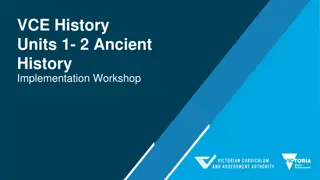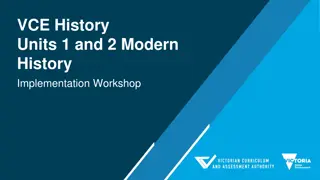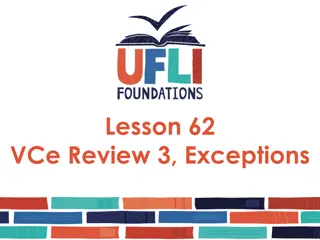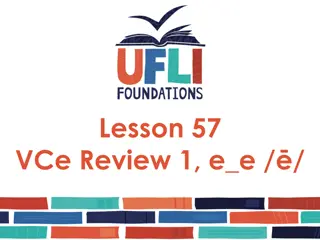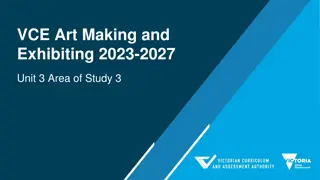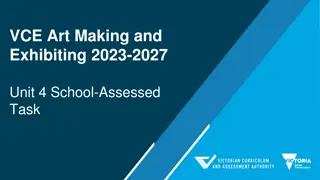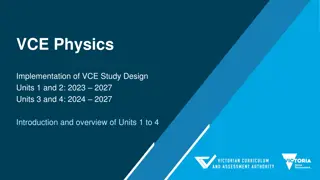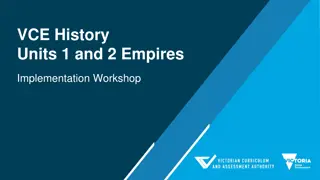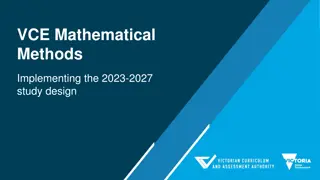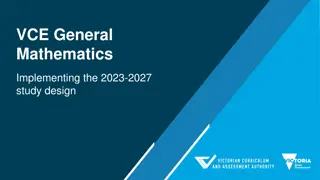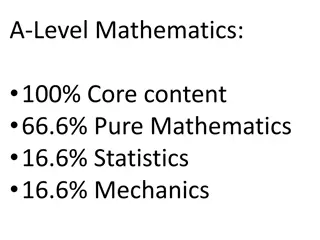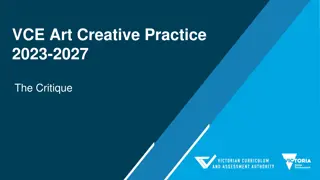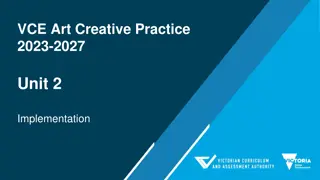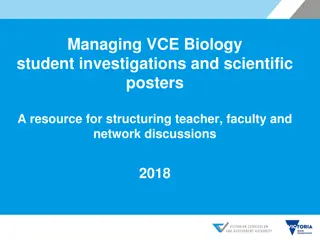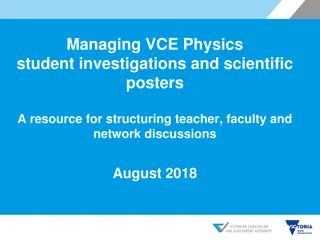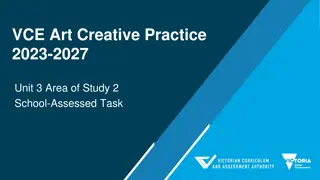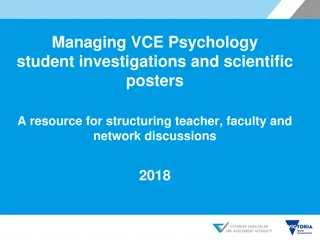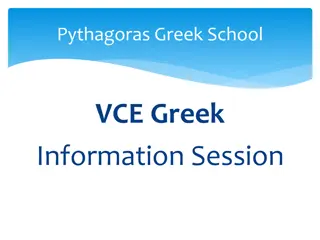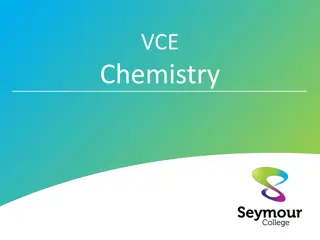Overview of VCE Specialist Mathematics 2023-2027 Study Design
The VCE Specialist Mathematics program for 2023-2027 study design aims to enhance students' mathematical skills through prescribed Units 1-4. This comprehensive curriculum covers topics such as algebra, discrete mathematics, space and measurement, functions, data analysis, and more. The course structure involves building foundational knowledge in Units 1 and 2 to prepare students for the more complex concepts in Units 3 and 4, emphasizing logical thinking, algorithms, and computational skills. This updated study design provides a detailed roadmap for students pursuing excellence in mathematics education.
Download Presentation

Please find below an Image/Link to download the presentation.
The content on the website is provided AS IS for your information and personal use only. It may not be sold, licensed, or shared on other websites without obtaining consent from the author. Download presentation by click this link. If you encounter any issues during the download, it is possible that the publisher has removed the file from their server.
E N D
Presentation Transcript
VCE Specialist Mathematics Implementing the 2023-2027 study design
General Outline 1. Brief background and new structure of VCE Mathematics 2023-2027 2. Outline of VCE Specialist Mathematics Units 1 4 revisions 3. Discuss Investigations for Unit 1&2 leading to SACs in Unit 3&4 4. Address some FAQs (If time runs out, my contact details will be supplied)
The Study Design 2023-2027 Result of a thorough consultation and review process Published in February 2022 VRQA accredited from 2023 until 2027 VCAA undertake ongoing monitoring of study design implementation over the life of the study design VCAA support the implementation of the study design through an implementation program that includes webinars, on-demand videos, support materials and resources that provide guidance around study design awareness and clarification, sample course structures, suggested learning activities and sample investigations
VCE Mathematics studies 2023 - 2027 From 2023 there are four completely prescribed Units 1 4 VCE Mathematics studies: Foundation Mathematics Mathematical Methods General Mathematics Specialist Mathematics In each sequence, Units 1 and 2 contain assumed knowledge and skills for Units 3 and 4. Mathematical Methods Units 1 and 2 also contain assumed knowledge and skills for Specialist Mathematics Units 3 and 4. Specialist Mathematics Units 3 and 4 assumes concurrent study, or previous completion, of Mathematical Methods Units 3 and 4.
Specialist Mathematics Units 1 & 2 The 2023 2027 Specialist Mathematics study design prescribes the content for each of Unit 1&2 and combines the content for Unit 3&4. Unit 1 Areas of Study Algebra, number and structure Discrete mathematics Unit 2 Areas of Study Algebra, number and structure Space and measurement Functions, relations and graphs Data analysis, probability and statistics
Specialist Mathematics Units 1 & 2 New: U1_AOS1: Topic: logic and algorithms Binary number systems Algorithms, computational thinking and pseudocode U1_AOS2: Topic: Sequences and series First order linear recurrence relations Adjusted focus: U1_AOS2: Topic: Matrices (arithmetic and elementary) U2_AOS1: Topic: Distribution of sums of DRVs (from U3&4) U2_AOS2: Topic: Trigonometry (explicit content descriptions) U2_AOS2: Topic: Vectors in the plane (application to kinematics)
Specialist Mathematics Units 1 & 2 Moved into Unit 1&2 from Unit 3&4: U2_AOS3: Topic: complex numbers Introductory and elementary work on complex numbers U2_AOS4: Topic: functions, relations and graphs Rational functions linked to partial fractions inverse circular functions absolute value
Specialist Mathematics Units 1 & 2 Removed/deleted: Prescribed topics: AOS4: Topic: geometry in the plane and proof (only sine, cosine rule, arc, segments, sectors remain) Prescribed topics: AOS5: Topic: graphs on non-linear relations (polar/parametric graphs of relations like limacon, cycloid, gone) Other topics: AOS5: Topic: kinematics (one dot point in vectors as an application of kinematics) Other topics: AOS6: Topic Simulation, sampling and distributions (Simulation and sample proportions gone)
Specialist Mathematics Units 3 & 4 Areas of Study: Discrete mathematics Functions, relations and graphs Algebra, number and structure Calculus Space and measurement Data analysis, probability and statistics
Specialist Mathematics Units 3 & 4 New: AOS1: Topic: logic and proof Conjecture, implications, deduction, quantifiers, induction AOS4: Topic: Differential calculus and integral calculus Integration by parts, surface area of solids, arc length by parametric AOS4: Topic: Differential equations Logistic differential equation AOS5: Topic: Vectors Cross product AOS5: Topic: Vector and cartesian equations All dot points
Specialist Mathematics Units 3 & 4 Adjusted focus: AOS6: Topic: distribution of linear combinations of random variables More explicit content descriptions AOS6: Topic: hypothesis testing More explicit content descriptions Removed/deleted: AOS5: Topic: Mechanics
Mathematical Investigation Units 1 & 2 For each unit: This comprises one to two weeks of investigation into one or two practical or theoretical contexts or scenarios based on content from areas of study and application of key knowledge and key skills for the outcomes. Investigation is to be incorporated in the development of concepts, skills and processes for the unit, and can be used to assess the outcomes.
Mathematical Investigation Units 1 & 2 There are three components to mathematical investigation: Formulation: overview of the context or scenario, and related background, including historical or contemporary background as applicable, and the mathematisation of questions, conjectures, hypotheses, issues or problems of interest. Exploration: investigation and analysis of the context or scenario with respect to the questions of interest, conjectures or hypotheses, using mathematical concepts, skills and processes, including the use of technology and application of computational thinking. Communication: summary, presentation and interpretation of the findings from the mathematical investigation and related applications.
Mathematical Investigation Units 1 & 2 Can be implemented in a variety of ways to meet requirements: as an investigative learning activity or activities as an assessment task or tasks a combination of the above Time range 1 to 2 weeks: Minimum one longer activity/task, or two shorter activities/tasks over the equivalent of 1 week duration Up to 2 weeks, a suitable combination, for example, two longer activities/tasks, one longer and two shorter activities tasks, three medium activities/tasks, four shorter activities/tasks
Mathematical Investigation Units 1 & 2 provides a natural and effective context for addressing Outcome 2 and Outcome 3 can be used to support computational thinking and experimentation is one of the assessment task types listed for Units 1 and 2 provides preparation for the application, problem solving and modelling tasks in Specialist Mathematics Units 3 and 4.
Specialist Mathematics Units 3 4 In Units 3&4, the assessment weighting used to calculate the final study score has been slightly re-adjusted (p. 12 in 2023-2027 study design)
SACs in Units 3 & 4 Application Task Outcomes Outcome 1 Define and explain key concepts as specified in the content from the areas of study and apply a range of related mathematical routines and procedures. Marks allocated Assessment task Application task A mathematical investigation of a practical or theoretical context involving content from two or more areas of study, with the following three components of increasing complexity: 15 Outcome 2 Apply mathematical processes in non-routine contexts, including situations with some open-ended aspects requiring investigative, modelling or problem-solving techniques or approaches, and analyse and discuss these applications of mathematics. Outcome 3 Apply computational thinking and use numerical, graphical, symbolic and statistical functionalities of technology to develop mathematical ideas, produce results and carry out analysis in situations requiring investigative, modelling or problem-solving techniques or approaches. introduction of the context through specific cases or examples 20 consideration of general features of the context variation or further specification of assumption or conditions involved in the context to focus on a particular feature or aspect related to the context. 15
Pseudocode Introduction Pseudocode is a tool for representing algorithms without the use of a particular programming language and related syntax. It is written in a combination of plain English and common symbols, and describes, in a detailed step-by-step manner, the processes used in the algorithm. An example for finding the smaller of two numbers a and b Algorithm: minimum of two numbers inputa, b if a bthen printa else printb end if
Computational Thinking Decomposition Break down the problem into simpler, less complex components Pattern Recognition Classify patterns in data and organizing data logically Representation and interpretation Abstraction Removing non essential information and focusing on principal structure only Algorithms A sequence of instructions that can be performed Link is HERE.
Some FAQs Will Support material be available and when? Will sample SACs be published by VCAA? Will pseudocode be examinable? Has the SAC structure (effectively) changed? What does algorithmic thinking look like? What is the role of computational thinking?
Some FAQs The extent to which logic and proof should be taught? Expected notation for logic and proofs?
Contact Michael MacNeill Curriculum Manager, Mathematics Victorian Curriculum and Assessment Authority Level 7, 2 Lonsdale Street, Melbourne 3000, Victoria T +61 3 7022 5538 M 0438 602 765 Email: Michael.MacNeill@education.vic.gov.au





